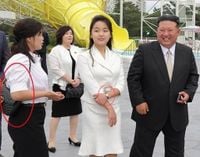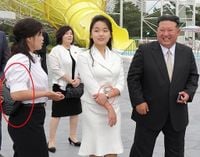On June 24, 2025, North Korea marked a significant milestone with the grand completion ceremony of the Wonsan-Kalma Coastal Tourist Zone, a sprawling resort complex in Gangwon Province. This event not only showcased the regime's ambitions to bolster domestic and international tourism but also featured the rare public appearance of Ri Sol-ju, wife of Supreme Leader Kim Jong-un, who had been absent from official events for nearly 18 months.
The Korean Central News Agency (KCNA) reported that the ceremony was held with great pomp and circumstance, attended by Kim Jong-un, Ri Sol-ju, their daughter Kim Ju-ae, and Kim Jong-un's sister, Kim Yo-jong, who serves as the vice department director of the Workers' Party. The presence of the entire Kim family underscored the political significance attached to the resort's completion.
Described by KCNA as a premier tourist destination, the Wonsan-Kalma zone boasts accommodations capable of hosting nearly 20,000 guests, with a combination of hotels and guesthouses. The resort includes seaside swimming facilities, various sports and entertainment venues, commercial establishments, and dining services, designed to deliver year-round cultural and recreational experiences along the scenic East Sea coast.
The resort is set to open its doors to domestic tourists starting July 1, 2025, with plans to gradually attract foreign visitors, notably Russian tourists. This is evidenced by the attendance of Alexandr Matsegora, the Russian Ambassador to North Korea, and embassy staff as special guests at the ceremony. Interestingly, the Chinese Ambassador was not invited, reflecting the current geopolitical nuances in the region.
Kim Jong-un himself has been personally invested in the project since its groundbreaking in July 2016, overseeing its progress through seven on-site inspections. The nine-year development faced numerous challenges, including material shortages due to international sanctions and disruptions caused by COVID-19 lockdowns. Nonetheless, Kim expressed satisfaction with the final outcome, declaring the project a "fulfillment of a long-held desire" and one of the "year's greatest achievements," fulfilling a decision from the 8th Party Congress.
Looking ahead, Kim announced plans to build additional large-scale tourism and cultural zones across North Korea, with a formal confirmation expected at the 9th Party Congress next year. This signals an ongoing state strategy to develop the tourism sector as a means of economic growth and foreign currency acquisition.
Amid the ceremony's high-profile display, Ri Sol-ju's appearance drew significant attention. This was her first public engagement since the New Year's performance on January 1, 2024. She was dressed in a casual yet elegant ensemble—a white blouse paired with black pants—and notably carried a luxury handbag, widely estimated to be a Gucci "GG Marmont Medium Shoulder Bag," valued at around 3 to 4 million South Korean won (approximately 2,200 to 3,000 USD).
Kim Ju-ae, standing directly beside her father, wore a striking white two-piece dress and was adorned with a luxury Swiss watch, believed to be a Carl F. Bucherer "Benua Watch" model set with 42 brilliant-cut diamonds totaling 0.48 carats, priced at roughly 30.8 million won (about 23,000 USD). The prominence of Ju-ae at the event, particularly her close proximity to Kim Jong-un, has been interpreted by experts as an intentional move to highlight her as a potential successor, especially given Ri Sol-ju's comparatively subdued role during the ceremony.
Indeed, photographs from the event show Ri Sol-ju walking a step behind Kim Jong-un and Ju-ae, projecting the image of a "quiet first lady," focused on supportive roles rather than the spotlight. This contrasts with Ju-ae’s front-and-center presence, signaling a possible shift in the regime’s internal dynamics. A South Korean unification ministry official commented, "With Ju-ae's emergence, Ri Sol-ju's public presence has visibly diminished, suggesting a deliberate effort to elevate Ju-ae's profile." Yang Moo-jin, a professor at the University of North Korean Studies, concurred, stating, "It is a reasonable assumption that Ri Sol-ju reduced her public exposure to emphasize Ju-ae's potential as a successor. Their joint appearance conveys family stability, which the regime seeks to project as national stability."
Kim Yo-jong, while present, maintained a distance from the family, standing alongside working-level officials rather than joining the front line with Kim Jong-un and his immediate family. Notably, North Korea's Foreign Minister Choe Son-hui was positioned closer to Kim, engaging with visiting dignitaries including the Russian ambassador.
The Kim family's affinity for luxury goods has drawn international scrutiny, especially given North Korea's dire economic conditions. Despite United Nations Security Council Resolution 1718, adopted in 2006 in response to North Korea's first nuclear test, which explicitly bans the export of luxury goods to the country, the ruling elite continues to display high-end products. Ri Sol-ju's Gucci handbag, Ju-ae's diamond-studded Swiss watch, and Kim Yo-jong's previously spotted Christian Dior handbag during a 2023 Russian visit illustrate this trend.
These luxury items are believed to enter North Korea through diplomatic channels or via third countries, circumventing sanctions. Critics argue that such conspicuous consumption starkly contrasts with the reality faced by ordinary North Koreans, with reports from the World Food Programme indicating that approximately 40% of the population suffers from chronic hunger and food insecurity.
A North Korean expert noted, "The Kim family's luxury consumption is completely detached from the lives of ordinary citizens, highlighting the extreme wealth gap within the country." This disparity underscores the dual narrative of North Korea’s leadership: aggressively pursuing grand infrastructural projects and international tourism ambitions while much of its population grapples with severe deprivation.
The Wonsan-Kalma Coastal Tourist Zone, therefore, symbolizes more than just a resort; it represents the regime's attempt to craft an image of progress and modernity to both domestic and foreign audiences. Yet, the calculated staging of family appearances, the conspicuous display of luxury, and the selective opening of the zone to foreigners such as Russian tourists reveal the intricate balancing act Pyongyang performs between projecting strength and managing internal realities.
As the zone begins operations for domestic tourists in July 2025, the world will watch closely to see if North Korea can leverage this development to boost its economy and international standing or if it remains a showcase project amid ongoing challenges.





